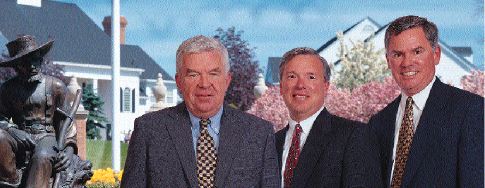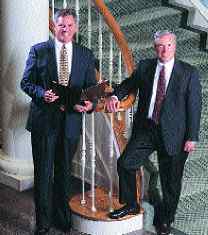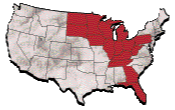

The Westfield Companies senior executive team includes (left to right) Cary Blair, chairman and CEO; Tom Kranstuber, senior vice president, business development; and Gary C. Gamble, executive vice president, operations.
One blustery March day in 1885 an independent insurance agent named Oliver Pilcher was traveling through the Ohio countryside on horseback. He represented Ohio Farmers Insurance Company, which had been around for almost 40 years, well before the Civil War. Pilcher rode into a violent snowstorm and soon realized it would be impossible to get home before dark. He was barely able to see as night fell but made his way toward a light shining from an unknown farmhouse and knocked on the door.
The family who lived there welcomed him inside, fed him, and gave him a place to spend the night. They also bought an Ohio Farmers fire policy from him. Today the agency which is the successor to Pilcher's still insures the same farm with Ohio Farmers.
Respect for the past runs deep at Westfield Companies, the insurance group that includes Ohio Farmers. This top-rated regional insurer is celebrating its 150th birthday in 1998, and 23 agencies have represented Westfield for more than 100 years. But Westfield has a healthy respect for the future as well.
"There's value in being 150 years old," says Cary Blair, Westfield chairman and CEO. "There are important traditions of integrity, business ethics and the value of service. But we must be careful not to get complacent. We're in an era of fantastic change, and some things that worked yesterday may not work tomorrow. We can't let our culture get in the way of growth."
One thing that will not change, Blair emphasizes, is the company's commitment to its agents. "Some companies have gone to blended distribution systems, writing some business on a direct basis. We have no plans to do that. Our agents are our primary customers."
Westfield received its charter in 1848 as "Ohio Farmers Insurance Company." But don't bother looking for a listing of the company's stock on any exchange. The charter was granted to the company before Ohio had corporate laws, so Ohio Farmers and its affiliates have been able to operate without stockholders for 150 years. "Essentially we can operate as though we are a privately-held company," says Blair.
 Gary Gamble (left) and Tom Kranstuber are among the Westfield senior executives who meet individually with about 70% of the company's agents each year.
Gary Gamble (left) and Tom Kranstuber are among the Westfield senior executives who meet individually with about 70% of the company's agents each year.
The name of the parent organization was changed to Westfield Companies in 1971. It acquired Beacon Insurance Company and American Select Insurance Company from The Hanover in 1993. In 1995 it acquired the Economy Fire and Casualty farm business from The St. Paul.
The Beacon/American Select acquisition brought to Westfield an array of niche products in commercial lines and personal lines. These products, now being offered in eight states, are not replacements for Westfield's broader product portfolios, but they do provide alternatives. "They are commodity-type products, processed in a highly-automated way for the agent who needs to compete head-to-head with a low cost company," says Blair.
In commercial lines, these products include BOP-type programs for a number of niches including optometrists and opticians, printers, restaurants, religious organizations and antique dealers.
In personal lines, Westfield is using American Select to write a new nonstandard auto program. This program has been offered only since February 1997, but Blair says it is a hit. "We're offering our agents an opportunity to write nonstandard auto with us instead of a company such as Progressive which also writes business direct."
Westfield's traditional products cover a wide range of the property/casualty spectrum. A couple of notable strengths are the Wespak personal lines package, accounting for about 25% of the company's personal lines business, and, on the commercial side, contract surety. "We're the largest writer of contract surety in Ohio, as well as some other Midwestern states," says Gary Gamble, executive vice president, operations. We've had an underwriting profit in contract surety for 42 years. And, to go along with the surety, we have special expertise in contractors package business."
In explaining the company's overall marketing strategy, Blair says, "On a shorter term basis we're going to stay highly focused on the things we do well." At the same time, he adds, "we also would consider mergers with small farm mutual companies. Many of these companies have Year 2000 compliance problems and may be looking for partners."
Westfield, which hasn't entered a new state since it went into Georgia and Wisconsin in 1987, also "is looking at a few other states for possible expansion," says Blair. "Where we would go depends on the regulatory and political environment."
Westfield is represented by about 1,600 agencies in 15 states, mostly in the Midwest and Southeast, and it is often the leading company in its agencies. About 400 of those agencies were firms representing Economy Fire and Casualty prior to Westfield's acquiring the farm book. Not counting the Economy farm agents the average Westfield agency size is $700,000 in annual premiums. Westfield's total book of business is about equally divided between personal lines and commercial lines.
 "Some companies have gone to blended distribution systems, writing some business on a direct basis. We have no plans to do that. Our agents are our primary customers."
"Some companies have gone to blended distribution systems, writing some business on a direct basis. We have no plans to do that. Our agents are our primary customers."
--Cary Blair, Westfield chairman and CEO
Westfield's approach to dealing with its agents often boils down to something pretty simple: personal contact. "We have over 3,500 licensed agents who represent us," says Blair, "and our senior management team talks to about 70% of them individually each year." Those Westfield executives include Blair, Gamble and Tom Kranstuber, senior vice president, business development.
An agents' institution of higher learning
The Westfield home office comes pretty close to being an insurance college campus, and it welcomes agents as both students and faculty at every possible opportunity. Its education and training department is staffed by 13 full-time employees and is housed in a separate building. Almost 2,000 agency personnel per year attend training sessions offered by Westfield. Most training events take place over one or two days, but some last several weeks. Many of them qualify for continuing education credits.
"They do the kind of training a lot of the better companies used to do 20 to 40 years ago," says Jim Berry of the Seibert-Keck Insurance Agency in Akron, Ohio. "Most companies today don't even train their own employees, let alone their agents," he adds. Seibert-Keck, primarily a commercial lines agency, has sent employees to the Westfield home office for training sessions, and Berry has served as an instructor for some agency sessions there.
Among the courses taught to agency personnel at Westfield are: property/casualty, life, agency automation, ethics, claims, sales skills, bonds, agency management and customer service. The typical tuition charged is $75 to $100 per day plus meals and lodging if required.
When agents are "on campus" overnight they stay at the Westfield Inn, a full-service hotel facility owned by the company. If time permits they also can play golf at one of two company-owned courses. Those near enough to the home office, located just south of Cleveland, can bring clients to play golf or tennis as well, and the company plays host to golf events for agents throughout the warm weather months.
In 1892, Westfield created an association for its agents with the purpose of "fostering friendly relations between the company and its agents." From that idealistic beginning the Westfield Agents Association has evolved into a practical body which gives the company's agents a voice in company policy. It operates with an 11-member agent board of directors which meets four times a year with Westfield's senior management. The ideas shared at the association meetings have a direct influence on company policy.
Steve Miller of the Palmer, Miller, Nelson Agency of Columbus, Ohio, recalls one meeting he attended in the '80s. "It was shortly after the company introduced its WIC billing program, and an agent board member asked whether the company could include the agency phone number underneath the agency name on the bill. Dale Smucker, who was president of Westfield then, looked at his computer person and said, 'Do it.' The next day when we got back to our office, the first billing statements we saw had the phone number included on there."
Sometimes the issues raised at the meetings require a longer term effort. At an association meeting in 1991, following discussion of agency perpetuation concerns, Westfield authorized the creation of a program to help agents bring new ownership into their firms. The Association Perpetuation Plan (TAPP) was launched the following year, and so far has helped train 77 inexperienced producers for agency ownership roles. (See box on page 43.)
Farm business via a new channel
Westfield's marketing practices took a new turn recently when it announced it would sell agriculture coverages through Poe & Brown, a large Florida-based agency. The product developed for the program, "Agriculture Protector Plan," is a broad package of farm coverages which includes property, general liability, workers comp, inland marine and umbrella.
Westfield will write agriculture business both through its own agents and those with whom Poe & Brown contracts. In doing so it will try to capitalize on Poe & Brown's program management expertise and business development techniques such as telemarketing, direct mail, advertising and trade show appearances. Westfield's goals for the program are ambitious. "We expect to double our farm business production," says Blair.
The joint marketing program will serve another purpose, explains Kranstuber. "It gets us into the program business in a product line that we're very comfortable with. As we get further along and learn what the marketing opportunities are, we may not limit this just to farm business."
Automation for its agency force plays a big part in Westfield's vision of the future. The company is part of the consortium of insurers which owns AMS, and recently Westfield began a program to help agents buy AMS automation management systems. It purchased 150 systems designed for medium-sized to large firms (AMS for Windows) which it will make available at a discount to its agents. Westfield also is evaluating the AMS Prime product to possibly subsidize its purchase for smaller agencies.
Westfield, which currently downloads with 759 agency locations, has always taken a big interest in agency automation. But now Year 2000 issues are giving it a renewed sense of urgency about its agencies' automation capabilities. The systems it is subsidizing from AMS would solve those problems for agents.
"It's a real concern to us that 20% of our agents have no automation," adds Kranstuber. "We're looking at network solutions we could provide to those agents. We're also experimenting with an Internet solution, both for those agents who are automated and those who aren't."
"We have to eliminate duplication in transactions with our agents," adds Gamble. "Becoming expense-efficient is our number one priority."
The property/casualty business has changed a lot since Ohio Farmers Insurance Company was founded and agents traveled on horseback. Whatever changes lie ahead in the next 150 years, Westfield's track record indicates it will be confronting those changes in partnership with its agents. *

The Westfield TAPP Program (The Agency Perpetuation Plan), brings inexperienced producers from its agency force into the home office and trains them for future agency ownership roles. A class of nine trainees (ages 22 to 38) from agencies in four states recently completed the six weeks of the spring '98 class. Another class begins this fall.
Since 1992 Westfield has spent more than $500,000 on the program and has trained 77 agents. "We're dedicated to improving the quality of our agents through this program, but agents really designed the curriculum," says Tom Kranstuber.
To participate, an agency pays a $1,000 fee to the Westfield Agents Association. All remaining tuition, room and board is paid by Westfield. A salary support loan (which can be forgiven with a two-year production requirement) also is available.
Many of those who have attended the training program are recent college graduates who have been licensed a short time with their agencies. But the TAPP program also has trained recruits in their 30s or 40s who became interested in the agency business after other careers. One such recruit is Ellen Cooper, now a producer with the Somers Agency in Lorain, Ohio. She also is one of two recruits who had no previous agency experience whom Westfield enrolled in the program.
"I had corporate sales and marketing experience in another industry and was looking for a career change," says Cooper. After completing the TAPP program she interviewed with six agencies and took the position with the Somers Agency, where she works on manufacturing accounts in the 19-person agency. "Westfield took a chance on me, and now I'm committed to them," she says.
Tim Whetstone, now a partner in Stauffer-Mendenhall Agency in Defiance, Ohio, had been with his agency for six months before enrolling in the TAPP program. "One of the benefits of the program is that while you're studying you're in close contact with high level people from The Westfield," he says.
David Benedict of the Benedict Agency in Painesville, Ohio, who chairs the TAPP Committee of the Westfield Agents Association, says, "The program teaches both sales and administrative functions, and it's a wonderful networking experience." And he adds, "One producer who went through the program is already the sole owner of an agency."
©COPYRIGHT: The Rough Notes Magazine, 1998